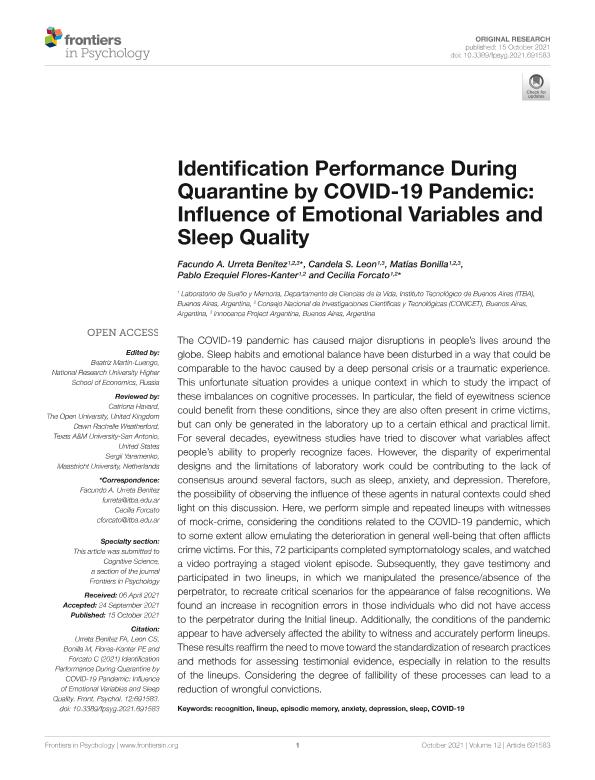Artículo
Identification Performance During Quarantine by COVID-19 Pandemic: Influence of Emotional Variables and Sleep Quality
Urreta Benitez, Facundo Antonio ; León, Candela Sofía
; León, Candela Sofía ; Bonilla, Matías
; Bonilla, Matías ; Flores Kanter, Pablo Ezequiel
; Flores Kanter, Pablo Ezequiel ; Forcato, Cecilia
; Forcato, Cecilia
 ; León, Candela Sofía
; León, Candela Sofía ; Bonilla, Matías
; Bonilla, Matías ; Flores Kanter, Pablo Ezequiel
; Flores Kanter, Pablo Ezequiel ; Forcato, Cecilia
; Forcato, Cecilia
Fecha de publicación:
10/2021
Editorial:
Frontiers Media
Revista:
Frontiers in Psychology
ISSN:
1664-1078
Idioma:
Inglés
Tipo de recurso:
Artículo publicado
Clasificación temática:
Resumen
The COVID-19 pandemic has caused major disruptions in people’s lives around the globe. Sleep habits and emotional balance have been disturbed in a way that could be comparable to the havoc caused by a deep personal crisis or a traumatic experience. This unfortunate situation provides a unique context in which to study the impact of these imbalances on cognitive processes. In particular, the field of eyewitness science could benefit from these conditions, since they are also often present in crime victims, but can only be generated in the laboratory up to a certain ethical and practical limit. For several decades, eyewitness studies have tried to discover what variables affect people’s ability to properly recognize faces. However, the disparity of experimental designs and the limitations of laboratory work could be contributing to the lack of consensus around several factors, such as sleep, anxiety, and depression. Therefore, the possibility of observing the influence of these agents in natural contexts could shed light on this discussion. Here, we perform simple and repeated lineups with witnesses of mock-crime, considering the conditions related to the COVID-19 pandemic, which to some extent allow emulating the deterioration in general well-being that often afflicts crime victims. For this, 72 participants completed symptomatology scales, and watched a video portraying a staged violent episode. Subsequently, they gave testimony and participated in two lineups, in which we manipulated the presence/absence of the perpetrator, to recreate critical scenarios for the appearance of false recognitions. We found an increase in recognition errors in those individuals who did not have access to the perpetrator during the Initial lineup. Additionally, the conditions of the pandemic appear to have adversely affected the ability to witness and accurately perform lineups. These results reaffirm the need to move toward the standardization of research practices and methods for assessing testimonial evidence, especially in relation to the results of the lineups. Considering the degree of fallibility of these processes can lead to a reduction of wrongful convictions.
Palabras clave:
ANXIETY
,
COVID-19
,
DEPRESSION
,
EPISODIC MEMORY
,
LINEUP
,
RECOGNITION
,
SLEEP
Archivos asociados
Licencia
Identificadores
Colecciones
Articulos(CCT - CORDOBA)
Articulos de CTRO.CIENTIFICO TECNOL.CONICET - CORDOBA
Articulos de CTRO.CIENTIFICO TECNOL.CONICET - CORDOBA
Citación
Urreta Benitez, Facundo Antonio; León, Candela Sofía; Bonilla, Matías; Flores Kanter, Pablo Ezequiel; Forcato, Cecilia; Identification Performance During Quarantine by COVID-19 Pandemic: Influence of Emotional Variables and Sleep Quality; Frontiers Media; Frontiers in Psychology; 12; 10-2021; 1-14
Compartir
Altmétricas



